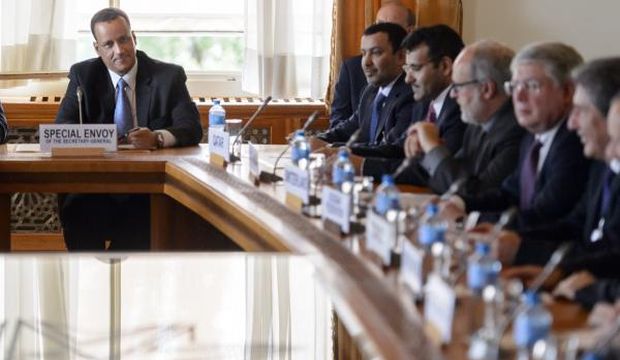
UN Special Envoy for Yemen Ismail Ould Cheikh Ahmed (L) meets the Group of Sixteen Ambassadors during a preparatory meeting on the eve of the Geneva Consultations on Yemen at the European headquarters of the UN, in Geneva, Switzerland, on June 14, 2015. (EPA/Laurent Gillieron)
Riyadh, Asharq Al-Awsat—Disputes between the Houthi movement currently in control of large parts of Yemen and their ally, ex-president Ali Abdullah Saleh, are threatening to derail peace talks due to take place in Geneva on Monday between the Shi’ite movement and Yemen’s internationally recognized government, sources have said.
A plane meant to be carrying the Houthi delegation from Sana’a arrived empty to the Swiss city on Saturday, according to airport officials. A senior diplomatic source—speaking on condition of anonymity—told Asharq Al-Awsat via telephone that disputes between the Houthis on one side and Saleh and his General People’s Congress (GPC) party on the other had resulted in the Houthi delegation refusing to board.
According to the source, the Houthis are rejecting the current format of the UN-sponsored talks, which would see UN Special Envoy to Yemen Ismail Ould Cheikh Ahmed hold individual meetings with each side, the Houthis and the government, before they sit down together for discussions.
Saleh, the GPC, and the Houthis also do not currently see eye-to-eye on the makeup of the Houthi delegation, with the Houthis refusing to accept UN Security Council Resolution 2216 as the main basis for the talks.
The resolution, adopted by the Security Council in April, stipulates the group’s militias vacate all areas in Yemen currently under their control and cease all hostile action against civilians.
But the source said the Houthis are insisting that the Peace and Partnership agreement signed with the government in late 2014 form the basis of the talks instead.
The talks have already been pushed back twice, having originally been scheduled for May 28 and then on Sunday—respectively due to the Houthis not agreeing to abide by Resolution 2216 and a disagreement among members of the group which arose over who would get on board the delegation’s Geneva-bound plane on Friday, according to sources.
Other sources have said the latest disputes are now threatening the talks taking place altogether.
The Yemeni government delegation, meanwhile, arrived in Geneva on Saturday as scheduled.
According to the sources, proposed members of the Houthi delegation have also refused to stay at the same hotel as their counterparts from the government and rejected an offer of a five-day humanitarian ceasefire from the Saudi-led coalition currently waging an aerial campaign against the group in Yemen.
Should the talks take place as scheduled on Monday, they would represent the first substantive meetings between the Houthis and Yemen’s internationally recognized government since the crisis in the country began last September.
Back then the Houthis occupied the capital Sana’a, taking over government, military and media buildings and facilities. They later spread throughout the country and eventually staged a coup in February, holding President Abd Rabbuh Mansur Hadi, Prime Minister Khaled Bahah, and other members of the cabinet under house arrest.
Both Hadi and Bahah later fled their house arrest in March, and Hadi then traveled to the Saudi capital Riyadh to request military intervention from Saudi Arabia and its Arab partners in order to restore political legitimacy in Yemen. The Saudi-led air campaign began on March 26.
Saudi Arabia, its Arab allies, and the international community have accused Iran and Saleh of aiding the Houthi coup and their advance across large parts of the country.
